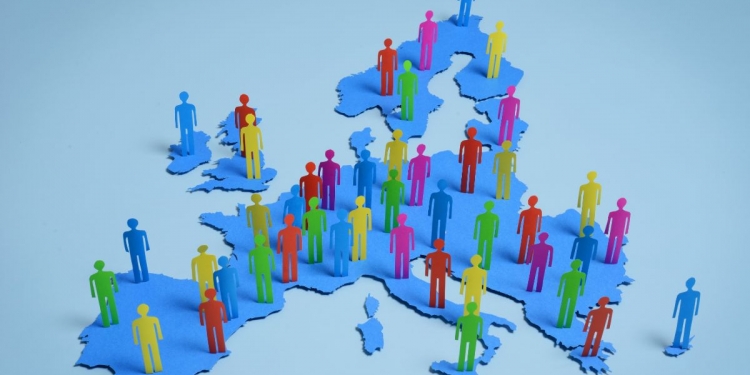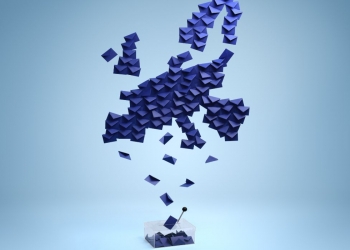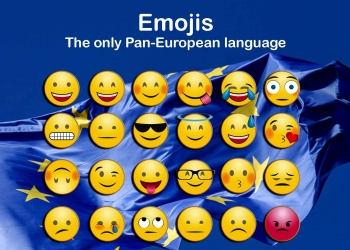While the coronavirus pandemic has been impacting on European daily lives for more than a year, attitudes towards the EU remain positive, according to the latest Standard Eurobarometer Public Opinion conducted in February-March 2021. The image of the EU and trust in the EU have increased and reached their highest levels in more than a decade. Europeans citizens identify health and the economic situation as the two top concerns both at EU and national levels.
The survey also indicates an increase in concern about the current state of national economies: 69% of Europeans think that the situation is currently ‘bad’ and 61% of Europeans fear that their country’s economy will recover from the impact of the pandemic ‘in 2023 or later’.
EUROPEANS AND POLITICAL INSTITUTIONS
Trust in national governments and parliaments and in the European Union
Close to half of Europeans trust the European Union (49%), after a steep 6-point increase since the Standard Eurobarometer of summer 2020, EB93. It’s the highest level registered since spring 2008. At the same time, trust in national governments (36%, -4 percentage points since summer 2020, but +2 since autumn 2019) and national parliaments (35%, -1 since summer 2020, +1 since autumn 2019) have lost ground, though both remain at a higher level than in autumn 2019. As a consequence, at +13, the percentage point gap between trust in the European Union and trust in the national government is the highest measured since autumn 2010, when it stood at +15.
Distrust of the European Union has decreased (43% “tend not to trust”, -5 percentage points since summer 2020), while distrust of national governments (60%, +4) and national parliaments (60%, +2) has increased.
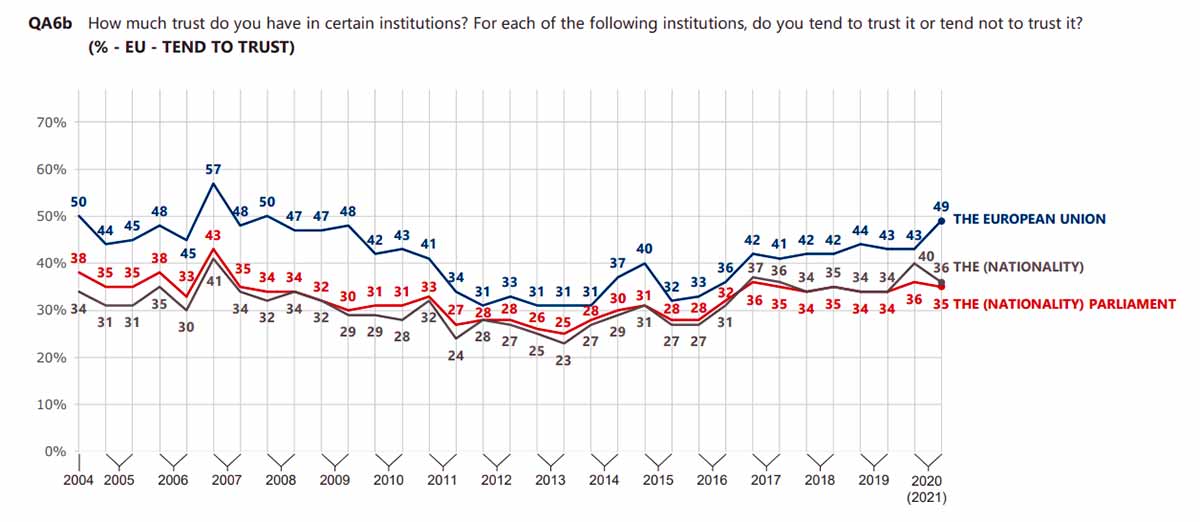
Trust in the European Union: national results and evolutions
In 20 Member States, a majority of respondents say they trust the EU (up from 15 in summer 2020), with the highest levels observed in Portugal (78%), Ireland (74%) and Lithuania (70%). More than six respondents in ten trust the EU in Malta and Estonia (both 64%), Denmark (62%), and the Netherlands and Latvia (both 61%), and at least half of them do so in Hungary (59%), Romania and Sweden (both 58%), Belgium (56%), Luxembourg and Slovenia (both 55%), Bulgaria (53%), Spain (52%), Croatia (51%), and Poland and Slovakia (both 50%). In Germany, a relative majority tend to trust the EU (48% vs 44% “tend not to trust”), and in Finland, public opinion is evenly divided (50% “tend to trust” vs 50% “tend not to trust”).
At the other end of the scale, distrust is the majority view in Greece (63%), Austria (53%), Czechia and Cyprus (both 52%), France (49% vs 39% “tend to trust”) and Italy (46% vs 44%).
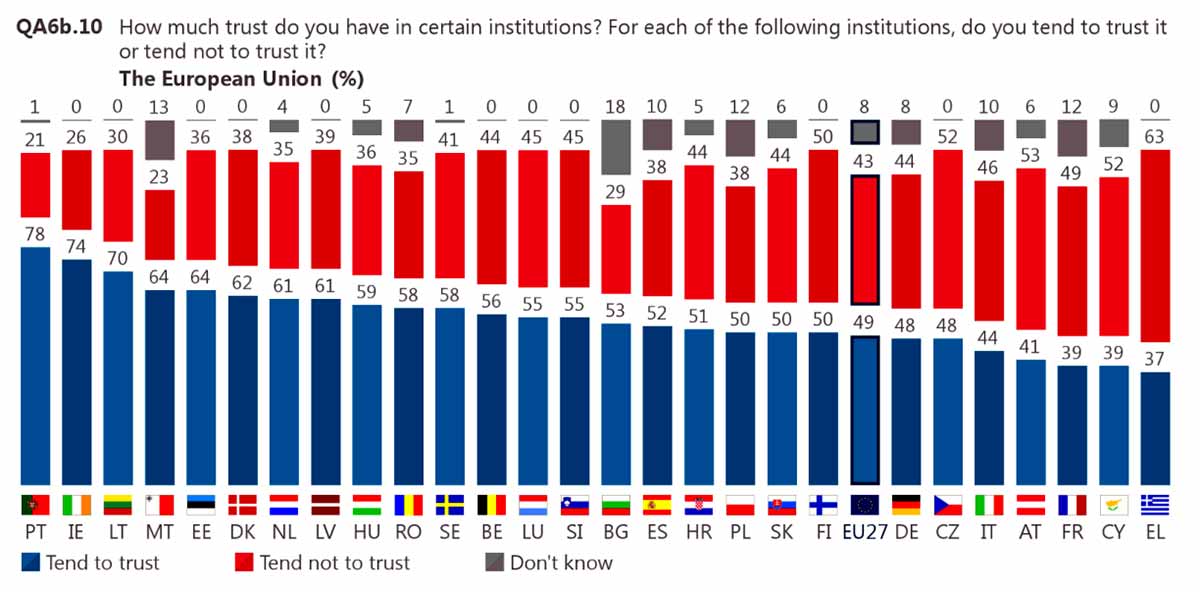
At national level, trust in the EU has increased in 23 EU Member States since the Standard Eurobarometer of summer 2020 (EB93), most spectacularly in Portugal (78%, +22 percentage points), Malta (64%, +19), Italy (44%, +16), Belgium (56%, +13), Czechia (48%, +13), the Netherlands (61%, +12), Lithuania (70%, +11) and Spain (52%, +10). Conversely, trust has declined in three countries: Poland (50%, -6), Austria (41%, -3) and Denmark (62%, -1), and has remained unchanged in Germany,
at 48%.
As a result of these changes, the majority in Belgium, Luxembourg, Slovenia, Spain, and Slovakia now tend to trust the EU.
THE ECONOMIC SITUATION
Current situation of the economy at national level: trend, national results and evolution
After the very large drop registered in summer 2020 (-13 percentage points between autumn 2019 and summer 2020), perceptions of the situation of the national economy have continued to deteriorate: 29% of EU citizens now think that their national economic situation is “good” (-5 percentage points since summer 2020), the lowest level for this indicator since spring 2013. Symmetrically, the proportion of Europeans who consider this situation to be “bad” has also gained ground (+5), and more than two-thirds now share this view (69%). At 2%, the proportion who say they “don’t know” has remained unchanged.
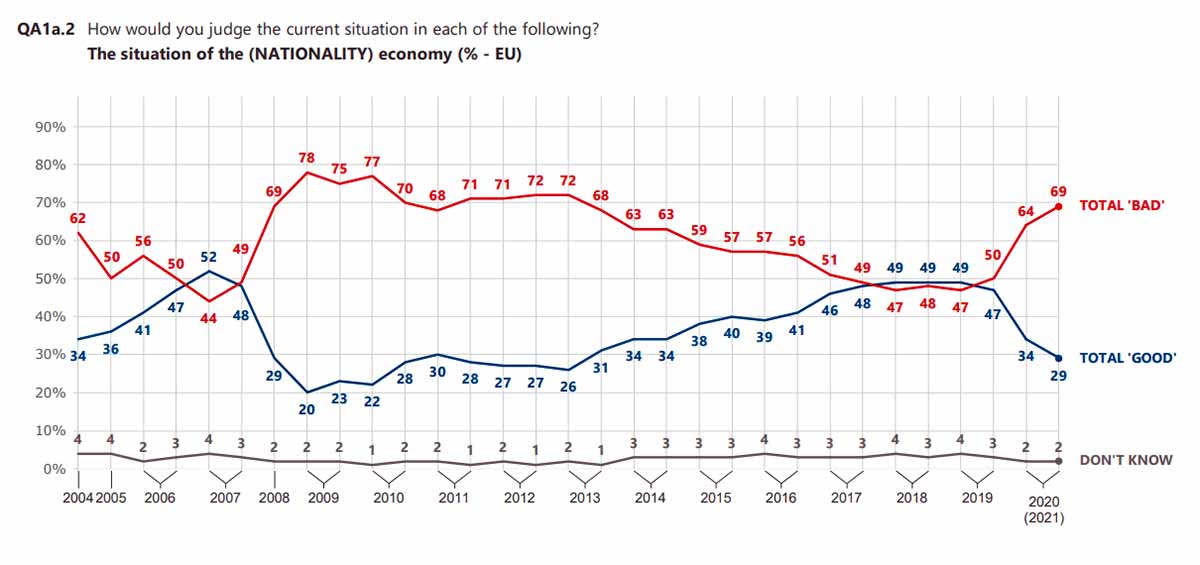
Perceptions of the current situation of the national economy varies widely between EU Member States, ranging from 86% in Luxembourg, down to 7% in Italy. Positive perceptions are now in the majority in eight EU Member States (down from 10 in summer 2020). More than two-thirds of the population see their national economic situation in a positive light in Luxembourg (86%), Sweden (81%), Denmark (71%) and the Netherlands (70%), while no more than one in ten do so in Italy (7%), Spain (8%), and Portugal, Greece, Bulgaria (all 10%).
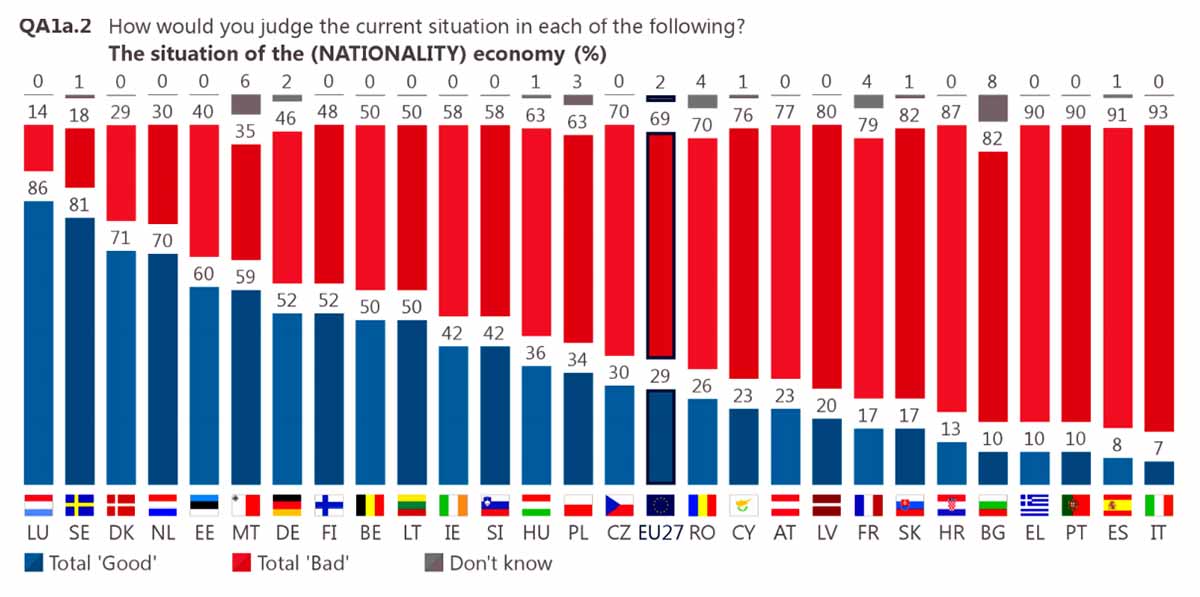
Compared with the Standard Eurobarometer of summer 2020 (EB93), positive perceptions of the current situation of the national economy have lost ground in 23 countries, with double-digit decreases in Poland (34%, -19 percentage points), Cyprus (23%, – 17), Austria (23%, -13), Hungary (36%, -12) and Denmark (71%, – 11). They have improved in four countries, in particular in Belgium (50%, +10) and Sweden (81%, +7). As a result of these changes, the positive perception has now become the minority view in Poland.
Eurobarometer: THE MAIN CONCERNS OF EUROPEANS
Close to four EU citizens in ten consider health as the most important issue facing the EU at the moment: this item is now mentioned by 38% of respondents, after a steep increase of 16 percentage points since summer 2020 when this item was introduced in the question. It has taken first place ahead of the economic situation (35%, unchanged), while the state of Member States’ public finances has slid into third position, with 21% of mentions (-2).
The environment and climate change is now in fourth place (20%, unchanged), while immigration, at 18% after a 5-point decrease, has fallen out of the leading trio of concerns for the first time since autumn 2014. Unemployment is in sixth position, with 15% of mentions (-2 percentage points).
Seven items are then cited by less than one respondent in ten: rising prices/ inflation/ cost of living (9%, -1), the EU’s influence in the world (9%, -1), terrorism (6%, -1), crime (5%, -1), pensions (3%, -1), energy supply (3%, unchanged) and taxation (3%, unchanged).
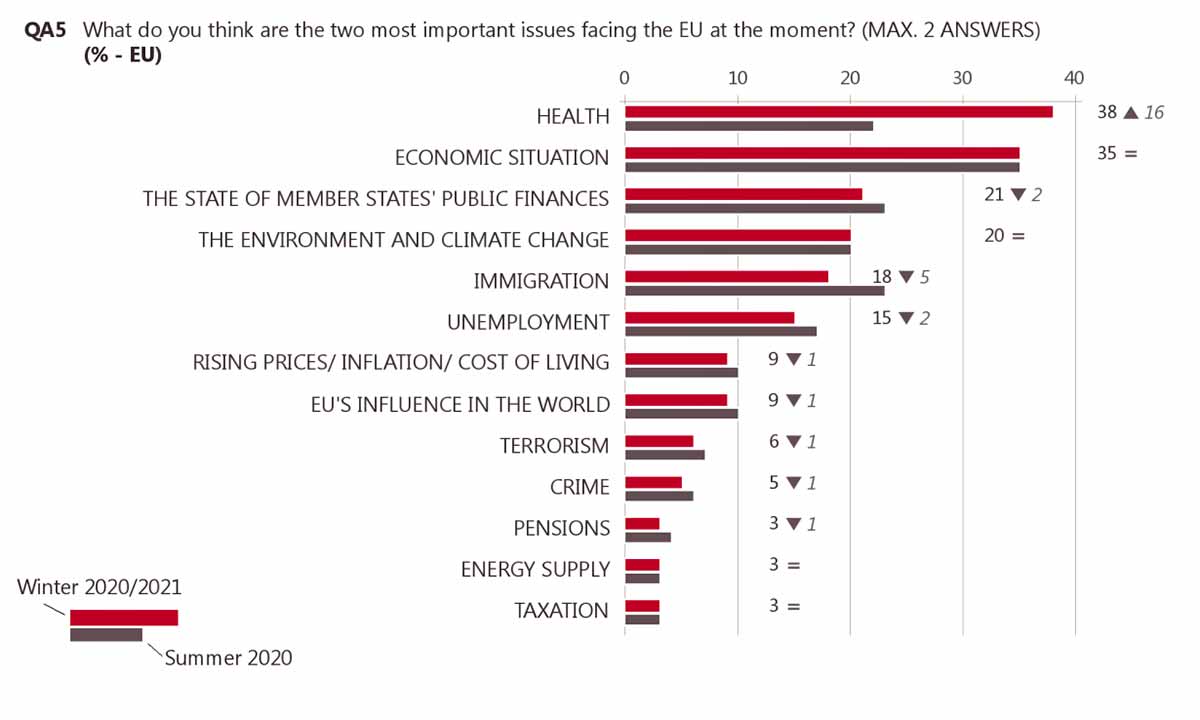
Eurobarometer Survey conclusions
This Standard Eurobarometer survey reveals that, in the specific context of the coronavirus pandemic, the EU is seen in a more positive light than at any time in the last ten years or more. While close to half of Europeans trust the EU, the highest level since 2008 when the financial and economic crisis began, the EU’s positive image has also reached its highest level since autumn 2009, at 46%. In line with these new highs, support for a European economic and monetary union with one single currency, the euro, has also reached its highest level ever registered, in both the euro area and the EU as a whole.
However, the impact of the coronavirus pandemic is massive on perceptions of the national economy, which have continued to plummet: less than three Europeans in ten now think it is “good”, while more than two-thirds say it is “bad”.
Health is now seen as the most important issue
More than a year after the start of the pandemic, health is now seen as the most important issue facing the EU, mentioned by close to four Europeans in ten, after a significant rise since summer 2020. The economic situation comes close behind, mentioned by more than a third, while just over a fifth of respondents cite the state of Member States’ public finances, in third place. Health is also perceived as the first issue at the national level, with 44% of mentions, far above the economic situation, mentioned by a third of respondents, and unemployment, cited by one in four Europeans.

Despite the positive assessments on trust and image of the EU, more than half of Europeans are not satisfied with the measures taken to fight the coronavirus by the European Union, and their national government. Since summer 2020, satisfaction has dropped spectacularly for measures taken by the
national government, but by only 2-percentage points for the measures taken by the EU. However, thinking about the EU’s response to the pandemic, more than half of Europeans continue to trust the EU to make the right decisions in the future, despite a slight decrease since summer 2020. Ensuring rapid access to safe and effective vaccines to all EU citizens, mentioned by more than one in three Europeans, is seen as the first priority for the EU in its response to the coronavirus pandemic.
The EU will recover in 2023 or later
More than six Europeans in ten believe that the EU will recover from the impact of the coronavirus pandemic in 2023 or later, and close to a quarter think that it will do so in 2022. Close to one in ten are very pessimistic: they think that the EU will never recover from the impact of the pandemic.
More than half of Europeans think that NextGenerationEU, the EU 750 billion euro recovery plan, will be effective.
The way Europeans have experienced the confinement measures has deteriorated since summer 2020: a majority of four Europeans in ten now think it was a difficult experience; just above three in ten think that it was both easy and difficult to cope with, and less than three in ten think that it was easy.
If Covid-19 vaccines were available for them, more than four Europeans in ten would get vaccinated as soon as possible, and further 20% would do so later in 2021. More than a fifth answer “later”, and more than one in ten respondents say they will “never” get vaccinated.
Seven Europeans in ten agree that a vaccine is the only way to end the pandemic, but a similar proportion also consider that COVID-19 vaccines could have long term side-effects that we do not know yet, while more than half say that COVID-19 vaccines are being developed, tested and authorised too quickly to be safe.
What is Eurobarometer ?
Since 1973, the European institutions commission regular public opinion surveys, the Eurobarometer, in all EU Member States.
In 2007, the European Parliament launched its own specific Eurobarometer series. These surveys cover a wide range of issues, focusing on citizens’ perceptions and expectations towards EU action, and the main challenges the Union is facing. The surveys also measure in detail citizens’ attitudes towards the EU and the European Parliament, while also keeping a close eye on the public’s views on the European elections.
Due to this long-running exercise, the analysis of the results provides detailed insight into trends and evolution of public opinion on European issues, both on a national and a socio-demographic level.

